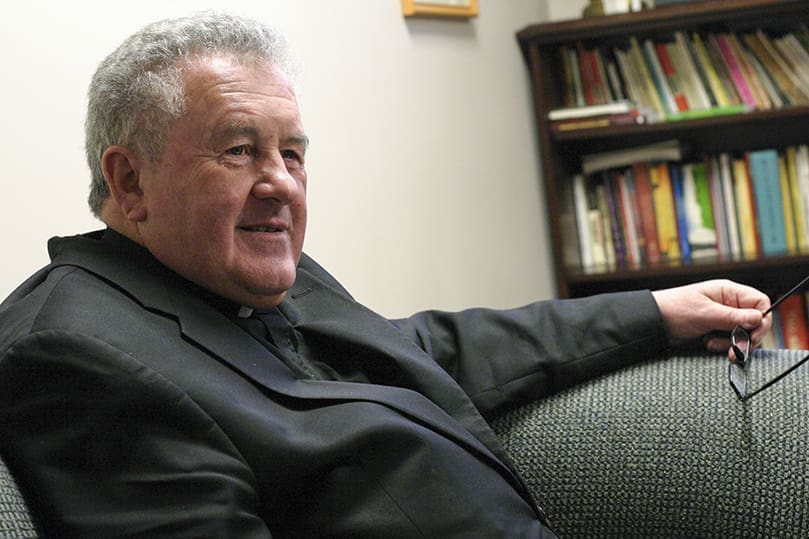 Photo by Michael Alexander
Photo by Michael AlexanderAtlanta
Atlanta’s Irish Priests Have Shaped Archdiocese
By STEPHEN O'KANE, Staff Writer | Published March 18, 2010
Msgr. James Fennessy sat in his office at St. Jude the Apostle Church and smiled as he recalled the 1968 plane ride from Ireland to the United States, where he was preparing to serve as a newly ordained priest for the Archdiocese of Atlanta.
As the plane was preparing to touch down in New York City, the 25-year-old priest could already recognize the differences between this new land and his home in County Tipperary in the south of Ireland. The Irish priest, who grew up in the rural countryside of Clonmel, where his home and others had no electricity, was now looking down on the bustling cities, suburbs and homes of the United States, some of which even had their own swimming pools.
To break the growing nervous silence between himself and his two priest companions, Father Terry Kane and Father Vincent Mulvin, who were also arriving to serve, the young Fennessy joked that he hoped his new parish would have a swimming pool—a moment he still laughs about today.
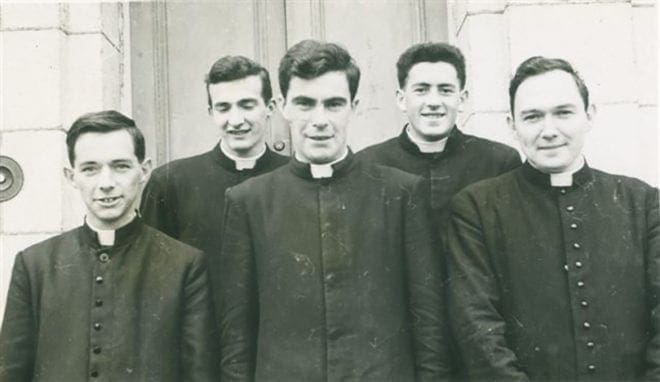
This 1964 photo of Atlanta seminarians from Ireland includes (front row, l-r) Msgr. Edward Dillon, pastor of Holy Spirit Church, Atlanta, Msgr. Paul Fogarty, pastor of St. Thomas More Church, Decatur, the late Msgr. Peter Ludden, (back row, l-r) the late Father Vincent Mulvin and Msgr. James Fennessy, pastor of St. Jude the Apostle Church, Atlanta. The photo was taken at St. Patrick College, Carlow, Ireland. Photo Courtesy of Msgr. James Fennessy
The three priests were members of the 1968 class of St. Patrick’s College in Carlow and were recruited by Msgr. P.J. O’Connor, a Savannah native of Irish descent who was instrumental in bringing more than 40 priests to serve the dioceses of Savannah and Atlanta. Msgr. Fennessy’s interactions with Msgr. O’Connor led him to the southeastern United States, where he has now ministered for over 40 years.
“Msgr. O’Connor came to Ireland and said there were a lot of Irish names in Atlanta, but they weren’t Catholic,” recalled Msgr. Fennessy. He said Msgr. O’Connor felt the area needed Irish priests to minister to its people since with a lack of priests and Catholic churches in the South, Catholics seemed to be joining whatever denomination was closest to their homes.
“That seemed to strike a chord with me,” said Msgr. Fennessy.
Vocations to the priesthood were nothing unusual for his family either. Msgr. Fennessy had two uncles serving as priests in Glasgow, Scotland, and a first cousin who was a member of the Sisters of the Holy Family. He remembers his uncles visiting every year and sharing stories of their work. But he could hardly imagine what to expect when he answered God’s call and found himself thousands of miles away from home.
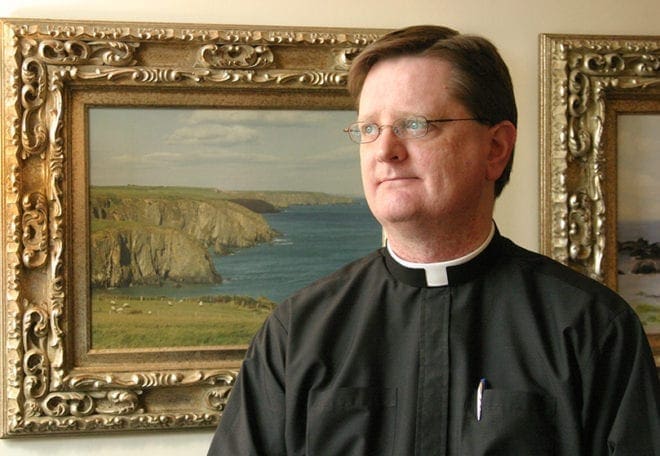
Msgr. Joseph Corbett, Vicar General and Moderator of the Curia, stands before a painting in his office that shows a beach near his hometown Irish village of Stradbally, County Waterford. Archbishop-emeritus John F. Donoghue ordained Msgr. Corbett in Ireland on May 28, 1995. In June of that year he took on his first assignment at All Saints Church, Dunwoody. Photo by Michael Alexander
The hustle and bustle of city life took some getting used to for the priest. Growing up in an agricultural part of Ireland did not include watching television or listening to the radio. Rather, a sense of community or “neighborhood” could be found in the countryside as families, friends and neighbors gathered often to enjoy each other’s company with homey visits.
It was this sense of community and welcoming that was needed in the growing city of Atlanta during the 1960s, said Msgr. Fennessy. Many people were relocating from other parts of the country and looking to find a faith community where they could grow and worship.
“Often they left some family and came from the North,” Msgr. Fennessy said. “The one thing they had that was consistent was the Church. That’s why it was so important to have a sense of welcoming.”
Atlanta was also in the midst of the civil rights struggle, giving the new priests a direct look at the social and spiritual issues going on in the country at the time. It was a period of learning and growing for the young men, who always found themselves surrounded by a Catholic presence.
The young Father Fennessy himself received a very warm welcome at his first assignment at Holy Cross Church, Atlanta—an experience that made the priest’s drastic transition much easier.
“I noticed a devotion to the Eucharist and people were very into the Mass. In Ireland, it wasn’t common for the congregation to sing together,” said Msgr. Fennessy about his first impressions of the Catholic faithful in Atlanta.
But it wasn’t just the laity who welcomed Father Fennessy with open arms. The clergy at Holy Cross also made sure he felt that Atlanta was indeed his new home.
“Archbishop (Eusebius) Beltran was my first pastor. He was very good to me,” recalled Msgr. Fennessy about the Atlanta archdiocesan priest who is now archbishop of Oklahoma City. “Also, there was the late Msgr. (Thomas) Kenny. He laid a good foundation for me.”
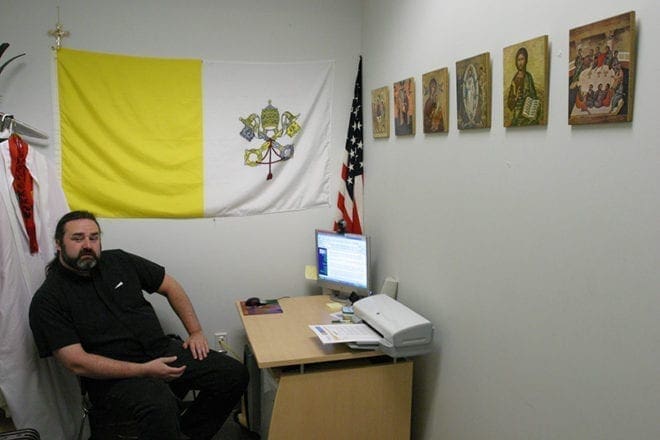
Ireland native Father Stephen Lyness serves as the campus minister for the Catholic Student Association at Georgia State University, Atlanta. Photo by Michael Alexander
During the next few decades, Msgr. Fennessy built on that strong pastoral foundation and got an up-close look at the Archdiocese of Atlanta, serving several parishes throughout the metro Atlanta area from Holy Cross to St. John Neumann, Lilburn, to St. Jude the Apostle Church, where he currently serves as pastor.
Throughout his time here, Msgr. Fennessy has seen significant changes in the archdiocese. The area has continued to experience a rapidly growing population, due to the relocation of Catholics from other parts of the country as well as from around the globe, and this has presented new challenges to the Church in North Georgia. He remembers when St. Michael Church in Gainesville was the only church along Interstate 85 outside the perimeter between Atlanta and South Carolina.
“There has been a huge change in the number of Catholics,” said Msgr. Fennessy. “The tremendous growth of parishes was challenging and exciting. I feel like we were both growing together.”
However, for Msgr. Fennessy and the other Irish priests, it was still a matter of welcoming the newcomers and making them feel comfortable in a parish and community setting.
“The language and culture challenges are different now,” said Msgr. Fennessy, noting that when he first came to Atlanta, most of the newcomers were English speakers. Now many come from Mexico, Central and Latin America, Vietnam and other countries.
“It is both a challenge and a blessing,” he said. “It is a great thing that God didn’t make us all the same. There is blessing in difference.”
This diversity is evident in Msgr. Fennessy’s parish today, where Sunday Mass is celebrated weekly in English, Spanish and Portuguese. St. Jude the Apostle is one of two Georgia parishes with a vibrant and growing Portuguese community, which has added to the multiculturalism present throughout the archdiocese.
The influx of Irish clergy to the Archdiocese of Atlanta has had its own impact, which continues today. In parishes of North Georgia, there are currently over 25 Irish priests who answered a call to leave everything behind and start anew in a foreign land. For many, that land has become home.
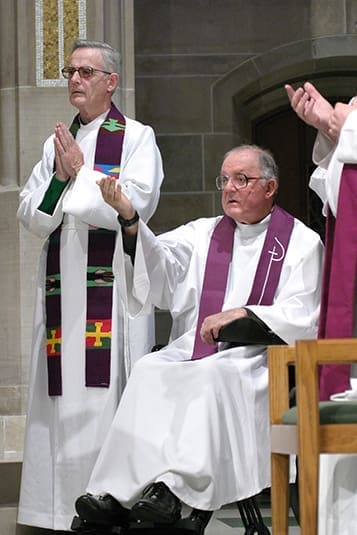
Father John Kieran, standing, pastor of St. Pius X Church, Conyers, and his brother Father Richard attend the annual St. Patrick Day Mass together. The Kieran brothers are native of Ardee (County Louth), Ireland. Father Richard, who celebrates his 45th anniversary as a priest this June, first served at Immaculate Heart of Mary Church when he came to Atlanta in 1965. Father John, a priest for close to 43 years, arrived in 1967 for his first assignment at St. Jude the Apostle Church. Photo By Michael Alexander
While their personal stories may be different, their vocation is one and the same, said Msgr. Joseph Corbett, who serves as a vicar general for the Archdiocese of Atlanta.
“In reality, whether a priest is from Ireland, Colombia, Illinois, Georgia or Texas, we bring our own faith experiences, our own love of God to the people of north and central Georgia,” he said. “It is by faithfully living, sharing, and using our God-given gifts and abilities that we impart the Good News to His people.”
Msgr. Corbett, who hails from Stradbally in County Waterford, Ireland, studied at St. John’s College, Waterford, and came to Atlanta in the 1990s, a few decades after the wave of Irish priests that included Msgr. Fennessy. He began serving at All Saints Church, Atlanta.
“Even though I had never been to the States, I knew that numerous students from the seminary had gone to serve as priests in Atlanta, and many of the students in classes with me were studying for Atlanta and spoke warmly of the archdiocese,” said Msgr. Corbett. “So with much prayer and listening to God, Atlanta seemed to be the one. A quick summer visit confirmed that. And then the official acceptance arrived from Archbishop Lyke.”
Msgr. Corbett’s call to the priesthood began when he was an altar server at his home parish of Holy Cross Church, in Stradbally, a village of about 100 families on the sea in the south of Ireland. He recalls feeling drawn to serve the Church and always enjoyed assisting at Mass.
“At some stage during those altar server days, the impetus to serve God as His priest fired up,” he recalled. “In truth, people would regularly say it to me. As a matter of fact, I vividly recall one occasion. It was after Sunday morning Mass as we were getting out of the car and my grandmother said to me, ‘Joseph, I think you will be a priest one day!’ ‘No, I don’t think so!’ was my answer. However, a little more than six years later I was off to St. John’s College for seminary.”
After being in Georgia for over 15 years, Msgr. Corbett is one of those priests who consider both the U.S. and Ireland to be home. He returns to visit Ireland a couple of times a year and, with technology like Skype, he is finding it much easier to stay in touch with family and friends across the pond. He is also in the process of becoming a U.S. citizen.
Msgr. Fennessy has spent most of his life here in Georgia but will always remember his roots in Ireland as he tries to return every year. He will never forget those evenings as a young boy when his parents, siblings and friends would gather together in community. It is this same feeling that he prays the Irish priests are providing for the faithful of the archdiocese today.
“I hope the Irish priests bring a sense of welcoming,” he said. “That quality of warmth is extremely important.”